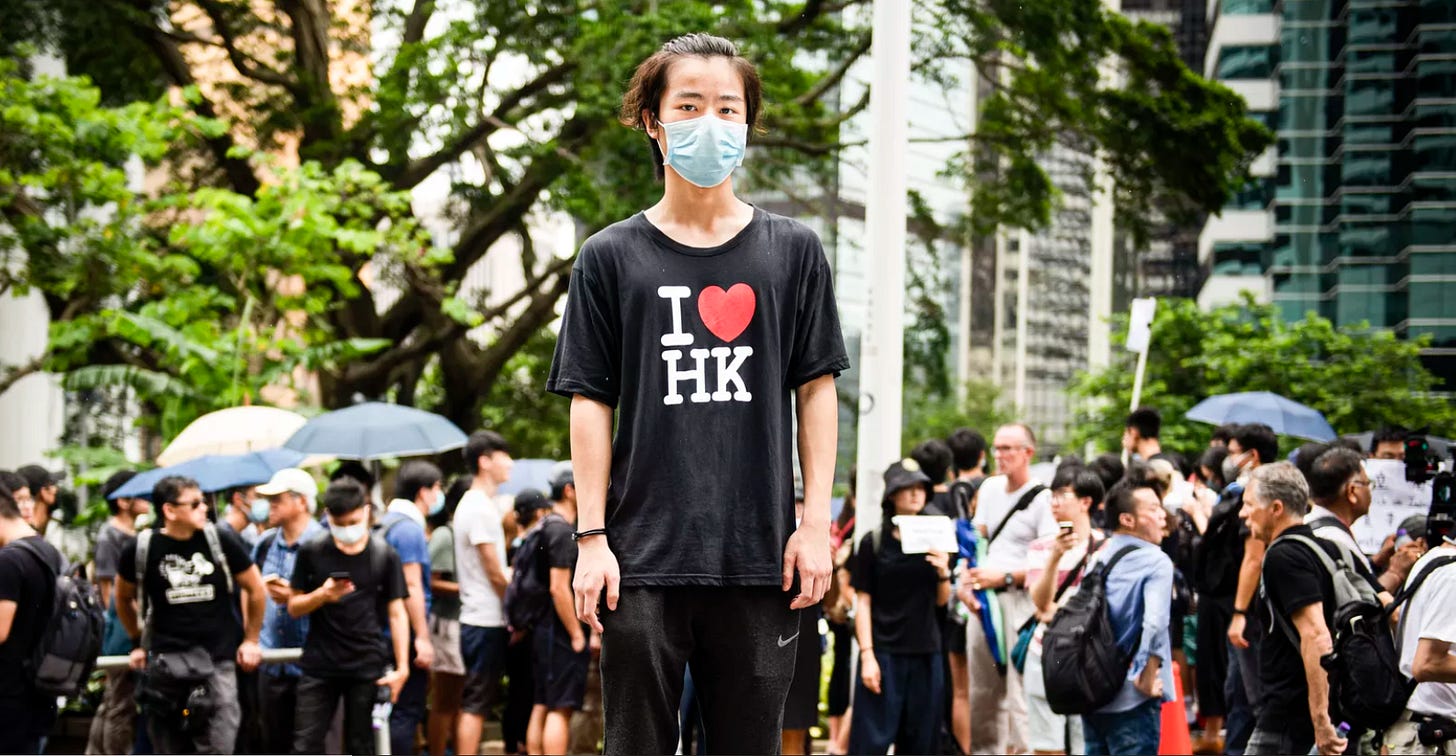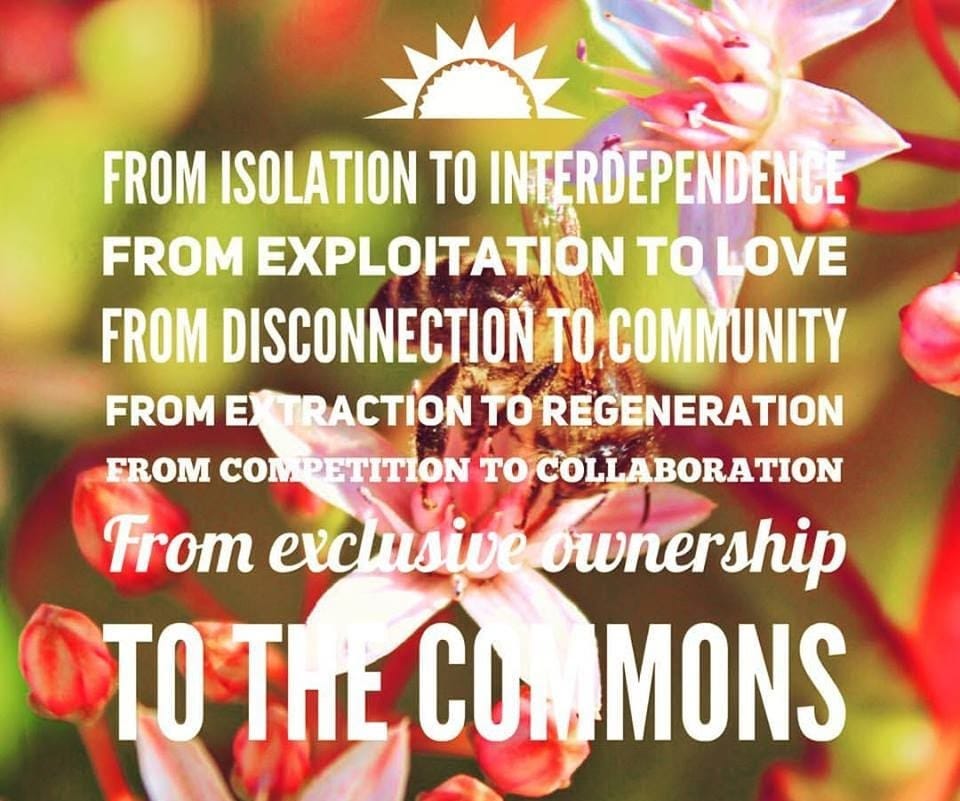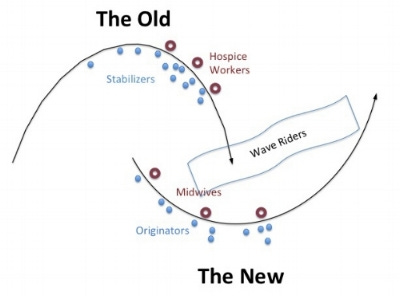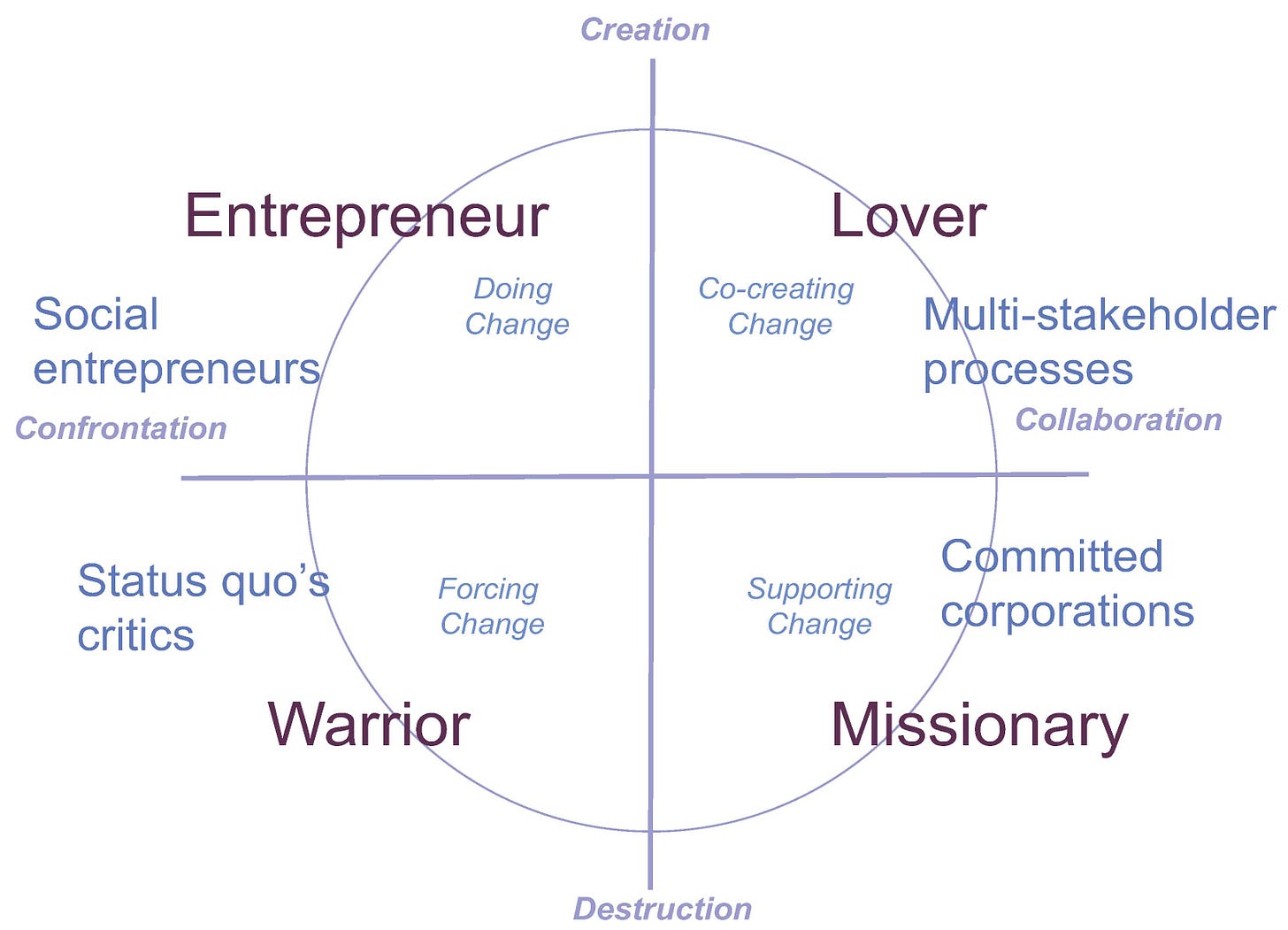My last post grappled with the need for radical imagination. As Christine Capra said:
What we can't imagine, we can't create. And the only way we ever create something new, for which there is no current model, is if we imagine it first.
But of course imagination is a necessary but insufficient condition for the transformation we so urgently need. We also have to do. We need a path to get there. As Sam Adler-Bell framed the challenge, channeling Jonathan Smucker:
We need both a compelling moral vision and a believable strategic agenda for achieving it.
I’ve been reflecting lately that much of the struggle and debate I encounter among the converted — those of us who believe in the need for system transformation on a global scale — is about how we achieve that scale. It’s about theories of change for how we move from the system of domination we live in to the system of human and planetary thriving that we all so desperately want.
Spoiler alert: I don’t have an answer. But I am beginning to see the building blocks and common principles that emerge from across a wide range of sources, most of which are not in dialogue with each other but nonetheless reach similar conclusions. Here are a few.
1) The starting point is the assertion that change is possible… and worth working for.
As James Baldwin said: “We made the world we’re living in and we have to make it over.”
Frances Moore Lappé cites German physicist Han-Peters Düerr’s reminder about biological systems: “There are no parts, only participants.” Every action we take in a system influences that system. She concludes:
We are therefore all co-creators. From this ecological worldview the only choice we don’t have is whether to change the world.
This refrain appears everywhere among those who are committed to working on the right side of history. This whole essay from Rev. angel Kyodo williams (thanks to Bo Zhang for sharing!) is searing and spectacular, but here’s where she comes out:
The only choice we really have is whether to try to be in relationship with the truth or to live in ignorance. There are no other choices. You have to actively engage… Outcomes are not our business. We don’t get to decide the outcomes… This quest for having the answer, knowing exactly how it’s going to unfold, being able to control, to dominate—it’s dominator culture. Free yourself. Get yourself out of that.
Sometimes it manifests in a darker way. I confess this is something I really struggle with: how to be honest about the stakes and the enormity of the challenge without slipping into fatalism, or worse, nihilism. This reflection by Meg Wheatley is a powerful and challenging read, though her conclusion ends on a note from Vaclav Havel that provides me some solace:
2) We have to change ourselves in order to change the world.
This one remains really hard for me, and is the subject of an entire post in its own right. I had long understood the quote attributed to Gandhi “Be the change you wish to see in the world” as a call for what I was supposed to do: fight for justice, etc. I now, thanks to the patient teachings of movement leaders like Grace Lee Boggs, understand it for what it says: we must be the change. We must embody it — not just intellectually, but viscerally — and let our own lives serve as testament to a different way of being in the world.
Dutch systems change theorist Jan Rotmans concurs (thanks to Kristian Bolk for the tip!), observing: “A system transition requires a personal transition.” Or as the inimitable bell hooks put it more simply:
When you’re fucked-up and you lead the revolution, you are probably going to get a pretty fucked-up revolution.
3) It starts with connection.
A previous post ruminated on how each of the systems of oppression driving the crises we now face stems from the original sin of separation. It’s obvious but bears repeating: connection is the antidote to separation. It is therefore the necessary foundation from which all our efforts must build. Network weaver Ev Shen recently introduced me to the concept of “tend-and-befriend.” Psychologist Kelly McGonigal coined the term as she explored the neuroscience behind the “fight or flight” impulse. She found that humans are wired both for fight or flight (a response more typical among men) AND for what she calls “tend or befriend” (a more common response among women). She concludes:
Whether you are overwhelmed by your own stress or the suffering of others, the way to find hope is to connect, not to escape.
4) Networks and movements to facilitate collective action are essential.
Of course movements are essential: look no further than the current mass mobilizations on the streets of Hong Kong — in the face of one of the most repressive authoritarian police states in the world — to insist on and win basic human rights. But how do they scale and replicate across very different sociocultural and political contexts?
Change Elemental has one of my favorite comprehensive treatments of this subject and its constituent components in their landmark series on Influencing Complex Systems Change.
5) These emergent networks must encourage and allow for self-organization and replication: the revolution will not be hierarchically directed.
Christine Capra, whose quote kicked off this post, offers one of the more beautiful ways of framing this emergent field by coining the term “eco-network” (fundamentally relational), which she contrasts with our more traditional “ego networks” (fundamentally transactional).
Miki Kashtan recently introduced me to the work of Belgian author Frederic Laloux, and his outstanding contributions around “re-inventing organizations.” There’s a lot of brilliance in there, but the core insight is that another way of organizing ourselves is not just possible but is already happening and is wildly successful in its early incarnations.
I find myself particularly drawn to the concept of resonance, and love this quote attributed to the French formation Comité Invisible.
Revolutionary movements do not spread by contamination but by resonance. Something that is constituted here resonates with the shock wave emitted by something constituted over there.… An insurrection is not like a plague or a forest fire — a linear process which spreads from place to place after an initial spark. It rather takes the shape of a music, whose focal points, though dispersed in time and space, succeed in imposing the rhythms of their own vibrations, always taking on more density.
And with thanks to Kristian for sharing: this is resonance (mind-bending).
I again need to lift up Detroit movement leader adrienne maree brown’s contributions here: her groundbreaking Emergent Strategy synthesized and integrated many of these concepts in a way that I continue to find deeply inspiring.
What are the models that we might build from? Laloux profiles several in his book. I’m also drawn to structures like Alcoholics Anonymous or the ManKind Project, both of which allow for decentralized autonomous organization paired with deep personal transformation. I’m intrigued by global models facilitating virtual connection like Wikimedia, or experiments in participatory democracy (blending on- and off-line organizing) like vTaiwan.
6) We must offer a new narrative.
We make sense of the world through stories, which tap into deep narratives that frame our understanding of how the world works (the Narrative Initiative offers some helpful working definitions here). David Bollier calls this the need for an “ontological shift.” What’s remarkable to me is how similar everyone’s conclusions are, even when they aren’t in dialogue with each other.
Nat Kendall-Taylor identifies three of these narratives that stand in the way of change: individualism, fatalism, and what he calls “us-vs-them-ism.”
Frances Moore Lappe contends that our “scarcity” mindset is a major impediment, and calls for us — echoing Capra above — to develop our “eco-mind.” She describes three major mindset shifts:
From separateness to connection…
From stasis to continuous change…
From scarcity to co-creation.
A new initiative launched by Alex Evans out of the UK called Collective Psychology offers these:
From fight-or-flight to self-awareness…
From powerlessness to agency…
From disconnection to belonging.
I love this little image/graphic from Aisha Shillingford:
7) There are many roles for individuals in catalyzing this transformation: play to your strengths and the position you occupy in society.
I love the “two loop framework” Deborah Frieze offers to describe the moment we’re in and our roles within it.
Laloux reaches a similar conclusion in his work on organizations:
We are at an inflection point: a moment in history where it’s time to stop trying to fix the old model and instead make the leap to the next one. It will be better suited to the complexity and challenges of our times, and to the yearning in our hearts.
Rotmans sees a similar framework and similar roles. This paper is a dense and overly theoretical read, but he identifies four roles that echo Frieze above: frontrunners, connectors, topplers and supporters.
Steve Waddell offers a much more accessible frame here that I also like (disclosure: I’m definitely a lover).
This reminded me of Bill Moyer’s classic Movement Action Plan, and the four roles he identified: advocate, helper, organizer, rebel. (Why always four roles? Maybe something about the intuitive appeal of a 2x2 framework for us recovering management consultants that yields these results…)
I know this is a lot for one post; congratulations if you made it this far. I realize I’m not offering a coherent theory of change: rather, this is an effort to distill the core principles such a theory of change must include.
I’ll close with a quote I love from Marianne Williamson challenging us to live into our fears and our hopes.








